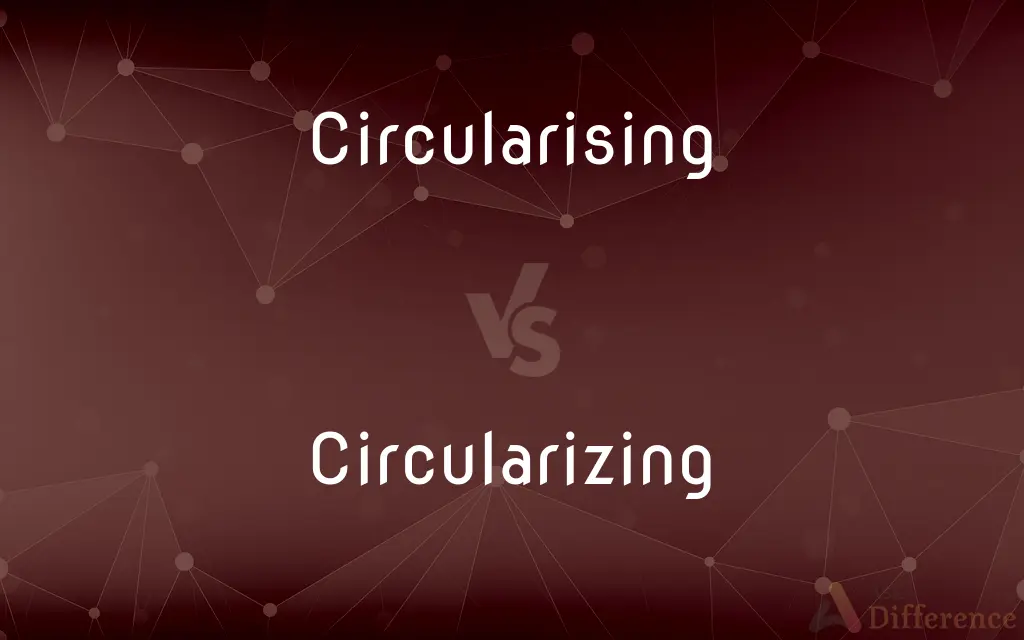Circularising vs. Circularizing — What's the Difference?
By Maham Liaqat & Urooj Arif — Updated on May 19, 2024
Circularising and circularizing are variant spellings of the same verb, with "circularising" being British English and "circularizing" being American English.

Difference Between Circularising and Circularizing
Table of Contents
ADVERTISEMENT
Key Differences
Circularising and circularizing refer to the act of distributing circulars or notices to a group of people. "Circularising" is the preferred spelling in British English, aligning with other verbs that use the "-ise" ending. In contrast, "circularizing" follows the American English convention of using the "-ize" ending for similar verbs.
Circularising appears in British English contexts, such as UK-based publications and documents, reflecting standard British spelling rules. Circularizing, on the other hand, is found in American English contexts, including US-based texts and official documents, adhering to American spelling conventions.
Both terms have the same pronunciation and meaning, involving the distribution of written communication, typically for informational or promotional purposes. The primary difference lies in the regional spelling preference, which is consistent with broader differences between British and American English.
In professional and academic writing, using the correct regional spelling is important for maintaining consistency and adhering to the preferred style guide. Understanding these variations can help in accurately interpreting and crafting documents intended for specific audiences.
Comparison Chart
Spelling Variant
British English
American English
ADVERTISEMENT
Common Usage
UK, Commonwealth countries
USA
Example Region
British publications
American publications
Spelling Rule
Aligns with other "-ise" verbs
Aligns with other "-ize" verbs
Pronunciation
Same as "circularizing"
Same as "circularising"
Compare with Definitions
Circularising
Typically done via email or printed materials.
They are circularising the policy changes through internal mail.
Circularizing
Spelling variant used in American English.
The school is circularizing the new term schedule to parents.
Circularising
Distributing circulars or notices to people.
The company is circularising its latest newsletter to all employees.
Circularizing
Distributing circulars or notices to people.
The company is circularizing its latest newsletter to all employees.
Circularising
Common in UK-based publications and documents.
The council is circularising the new regulations to residents.
Circularizing
Common in US-based publications and documents.
The council is circularizing the new regulations to residents.
Circularising
Involves spreading information widely.
The charity is circularising details about its upcoming event.
Circularizing
Involves spreading information widely.
The charity is circularizing details about its upcoming event.
Circularising
Spelling variant used in British English.
The school is circularising the new term schedule to parents.
Circularizing
Typically done via email or printed materials.
They are circularizing the policy changes through internal mail.
Circularising
Present participle of circularise
Circularizing
To publicize with circulars.
Circularizing
To canvass or poll using a questionnaire.
Circularizing
Present participle of circularize
Common Curiosities
What does circularizing mean?
Circularizing means distributing circulars or notices to a group of people, following American English spelling.
What does circularising mean?
Circularising means distributing circulars or notices to a group of people, following British English spelling.
Why do British and American English have different spellings for the same word?
Historical spelling conventions and language evolution have led to these differences.
Is there a difference in meaning between circularising and circularizing?
No, both terms have the same meaning; the difference is in regional spelling.
Which regions use the spelling circularising?
Circularising is used in the UK and other Commonwealth countries.
What type of documents typically use the term circularizing?
Circularizing is used in US-based publications, emails, and official documents.
Can software spell-checkers identify the difference between circularising and circularizing?
Yes, most spell-checkers can recognize and suggest the appropriate regional spelling.
Which regions use the spelling circularizing?
Circularizing is used in the United States.
How should I choose between circularising and circularizing in my writing?
Use the spelling that matches your intended audience's regional spelling conventions.
Can circularising and circularizing be used interchangeably?
Yes, but the spelling should match the regional language convention of the document or audience.
Are there other words with similar spelling variations in British and American English?
Yes, examples include "realise/realize," "organise/organize," and "analyse/analyze."
What type of documents typically use the term circularising?
Circularising is used in UK-based publications, emails, and official documents.
Does the pronunciation differ between circularising and circularizing?
No, the pronunciation is the same for both spellings.
Is it important to use the correct regional spelling in professional writing?
Yes, using the correct regional spelling ensures clarity and consistency in professional communication.
How can I remember which spelling to use?
Remember that "-ising" is for British English and "-izing" is for American English, aligning with other similar verb spellings.
Share Your Discovery

Previous Comparison
Proponent vs. Presenter
Next Comparison
Direct vs. TerseAuthor Spotlight
Written by
Maham LiaqatCo-written by
Urooj ArifUrooj is a skilled content writer at Ask Difference, known for her exceptional ability to simplify complex topics into engaging and informative content. With a passion for research and a flair for clear, concise writing, she consistently delivers articles that resonate with our diverse audience.
















































